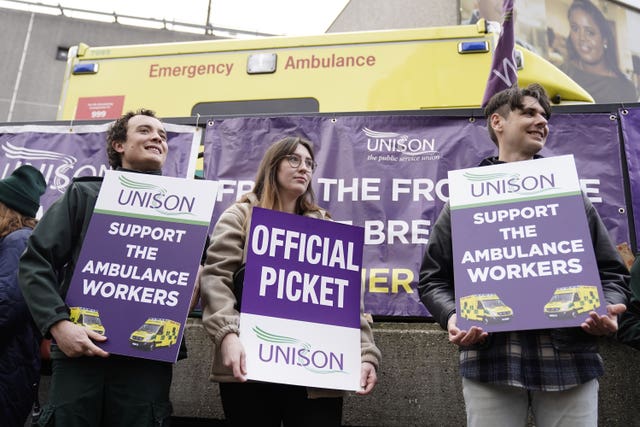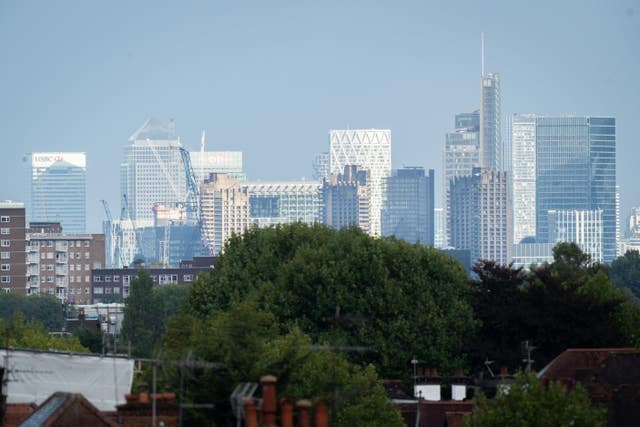Hunt prioritises reducing inflation over tax cuts as he lays out growth plan
The Chancellor said pushing inflation down was the ‘only sustainable way to restore industrial harmony’ in Britain.

The Chancellor said the “best tax cut right now is a cut in inflation” as he outlined how he plans to use Brexit and investment outside of London to drive UK economic growth.
Cutting inflation by half is one of Prime Minister Rishi Sunak’s top five priorities in the run-up to the next general election.
Jeremy Hunt, in a speech at Bloomberg’s London HQ, said reducing inflation was the “only sustainable way to restore industrial harmony” in Britain as he suggested tax cuts would have to wait.
It comes against a backdrop of public sector strikes over pay and predictions that the UK could be heading for a recession, with inflation standing at 10% according to some measurement forms.
“My party understands better than others the importance of low taxes in creating incentives and fostering the animal spirits that spur economic growth,” said Mr Hunt.
“Another Conservative insight is that risk-taking by individuals and businesses can only happen when governments provide economic and financial stability.
“So the best tax cut right now is a cut in inflation.”
Mr Hunt also used his speech to lay out a plan for Brexit to become a “catalyst” for growth, while announcing measures designed to increase prosperity outside of the South East of England and London.

The Chancellor said he wanted to reverse what he called a “declinism” attitude in Britain, declaring that the country’s economy had “grown at about the same rate as Germany” since the 2016 European Union referendum.
He said Brexit should be looked at as an opportunity to “create an economic environment which is more innovation friendly, and more growth focused”.
“Our plan for growth is necessitated, energised and made possible by Brexit,” he said.
“The desire to move to a high-wage, high-skill economy is one shared on all sides of that debate.

“We need to make Brexit a catalyst for the bold choices that will take advantage of the nimbleness and flexibilities that it makes possible.”
Mr Hunt, addressing the Government’s so-called levelling-up agenda, said a weakness of the economy was “over-concentration of wealth in the South East”.
He said levelling-up formed part of one of his so-called four “E” pillars against which he would assess growth policies: enterprise, education, employment and everywhere.
Unveiling proposals to drive regional economic prosperity, the Cabinet minister said the Treasury would be identifying investment zone sites that could be turned into “mini-Canary Wharfs”.
The regeneration of the docklands area since the 1980s has led to the creation of a major financial centre in east London.
Promising to provide “high-potential but underperforming areas” with “advantageous fiscal treatment to attract new investment”, he said work on identifying the locations would start shortly.
As part of his “employment” pillar, Mr Hunt encouraged those who had left the workforce during the Covid pandemic to return, telling them: “Britain needs you.”
The No 11 Downing Street incumbent said he would look at ensuring the “conditions necessary to make work worth your while” were in place so that returning to employment was an attractive proposition.
Rachel Reeves, Labour’s shadow chancellor, said: “Thirteen years of Tory economic failure have left living standards and growth on the floor, crashed our economy, and driven up mortgages and bills.
“The Tories have no plan for now, and no plan for the future. It’s time for a Labour government that will build a better Britain.”
Liberal Democrat Treasury spokeswoman Sarah Olney said: “This Conservative Party sounds like an unfaithful partner asking for yet another chance.
“But after crashing the economy and sending mortgages sky high, why should we trust them again?
“Jeremy Hunt’s speech is cold comfort for families and pensioners facing unbearable price rises.”





